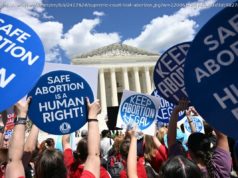What the law says about vaccine mandates, explained.
In 1902, the city of Cambridge, Massachusetts, faced a smallpox outbreak. In response, the local health board ordered the city’s residents over the age of 21 to be vaccinated against this disease. Violators faced a $5 fine. After a local pastor was fined for violating this vaccine mandate, he appealed his case all the way to the Supreme Court. The Court told him to pound sand in Jacobson v. Massachusetts (1905). “The liberty secured by the Constitution of the United States to every person within its jurisdiction does not import an absolute right in each person to be, at all times and in all circumstances, wholly freed from restraint,” Justice John Marshall Harlan wrote for the Court. He added that “there are manifold restraints to which every person is necessarily subject for the common good.” Under Jacobson, state and local governments — though not necessarily the federal government — may mandate vaccines for nearly all of their residents. That decision has obvious relevance today. We now have multiple vaccines against Covid-19 that are both safe and shockingly effective, and they are available for free for all Americans. Yet the pandemic continues to rage in the United States because a large minority of Americans have yet to get a shot. While some people may face legitimate obstacles, others are just obstinate. Policymakers and other leaders, in other words, may need to take a page from Cambridge’s early 20th-century health board. Some already are. Many of the first mandates are from employers: The state of New York, for example, recently announced that all of its employees will have to either get vaccinated or submit to weekly coronavirus testing, and President Joe Biden plans to impose similar requirements on federal employees. Many private employers also require vaccines — Google, for example, will insist that its employees be vaccinated in order to enter the company’s offices. More than 600 colleges and universities require at least some of their students, faculty, and staff to be vaccinated. These sorts of mandates will undoubtedly trigger lawsuits from vaccine resisters. In some cases, individuals with religious objections to vaccines or people with disabilities that preclude them from being vaccinated will have strong legal claims — much like schoolchildren who can already seek exemptions from schools’ vaccination requirements if they have religious objections. But, assuming that the courts follow existing law — and assuming that Republican state governments do not enact new laws prohibiting employers from disciplining workers who refuse to be vaccinated — most challenges to employer-imposed vaccination requirements should fail. Under Jacobson, moreover, states should be free to order everyone within their borders to be vaccinated against Covid-19, although it’s far from clear whether the federal government could do the same. Of course, there is no guarantee that the Roberts Court, which is eager to impose limits on public health officials and not especially bothered about overruling precedents, will follow Jacobson if a state does enact a vaccine mandate. But there is good reason to believe that it will. Even Justice Neil Gorsuch, one of the most conservative members of the current Court, recently described Jacobson as a “modest” decision that “didn’t seek to depart from normal legal rules during a pandemic.” The bottom line, in other words, is that, under existing law, numerous institutions within the United States may require their employees — and, in some cases, their citizens — to be vaccinated against Covid-19. Your boss probably can require you to get vaccinated Employment relationships in the United States are typically “ at-will,” meaning that an employee can be fired at any time and for any reason, even if that reason is completely arbitrary. If you have an at-will relationship with your employer, your boss can fire you because they don’t like your haircut. Or because they don’t like what you had for breakfast last Tuesday. Or, for that matter, because you refuse to get a Covid-19 vaccine. The general rule, in other words, is that your employer can fire you for any reason unless some outside legal force — a federal or state law, or maybe an individual or collective bargaining contract between you and your employer — intervenes to give you additional job security.






